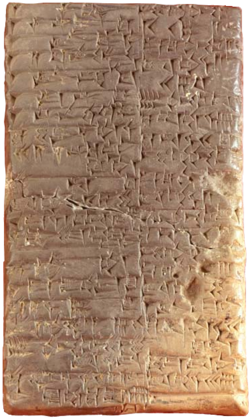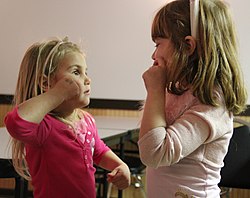Introduction




Language is a structured system of communication that consists of grammar and vocabulary. It is the primary means by which humans convey meaning, both in spoken and signed forms, and may also be conveyed through writing. Human language is characterized by its cultural and historical diversity, with significant variations observed between cultures and across time. Human languages possess the properties of productivity and displacement, which enable the creation of an infinite number of sentences, and the ability to refer to objects, events, and ideas that are not immediately present in the discourse. The use of human language relies on social convention and is acquired through learning.
Estimates of the number of human languages in the world vary between 5,000 and 7,000. Precise estimates depend on an arbitrary distinction (dichotomy) established between languages and dialects. Natural languages are spoken, signed, or both; however, any language can be encoded into secondary media using auditory, visual, or tactile stimuli – for example, writing, whistling, signing, or braille. In other words, human language is modality-independent, but written or signed language is the way to inscribe or encode the natural human speech or gestures.
Depending on philosophical perspectives regarding the definition of language and meaning, when used as a general concept, "language" may refer to the cognitive ability to learn and use systems of complex communication, or to describe the set of rules that makes up these systems, or the set of utterances that can be produced from those rules. All languages rely on the process of semiosis to relate signs to particular meanings. Oral, manual and tactile languages contain a phonological system that governs how symbols are used to form sequences known as words or morphemes, and a syntactic system that governs how words and morphemes are combined to form phrases and utterances.
The scientific study of language is called linguistics. Critical examinations of languages, such as philosophy of language, the relationships between language and thought, how words represent experience, etc., have been debated at least since Gorgias and Plato in ancient Greek civilization. Thinkers such as Jean-Jacques Rousseau (1712–1778) have argued that language originated from emotions, while others like Immanuel Kant (1724–1804) have argued that languages originated from rational and logical thought. Twentieth century philosophers such as Ludwig Wittgenstein (1889–1951) argued that philosophy is really the study of language itself. Major figures in contemporary linguistics include Ferdinand de Saussure and Noam Chomsky. (Full article...)
Selected language -

Tsez, also known as Dido (Tsez: цезйас мец (cezyas mec) or цез мец (cez mec)), is a Northeast Caucasian language with about 15,000 speakers (15,354 in 2002) spoken by the Tsez, a North Caucasian people in the mountainous Tsunta District of southwestern Dagestan in Russia. The name is said to derive from the Tsez word for 'eagle', but this is most likely a folk etymology. The name Dido is derived from the Georgian word დიდი (didi), meaning 'big'. (Full article...)
Did you know (auto-generated)

- ... that the Japanese-language children's show Kikaida, popularized in Hawaii by a Honolulu TV station, beat Sesame Street in the local ratings?
- ... that Czech industrialist Jan Felkl founded a company in 1854 that would produce globes in 17 languages?
- ... that a search engine for pirated books has been used to train large language models?
- ... that when Wilson Starbuck's play Sea Dogs was staged in 1939 it "contained some of the foulest language heard on Broadway" at that point in history?
- ... that in an effort to reclaim "the most offensive word in the English language" as aspirational, some people describe being "powerful in an unapologetic and feminine manner" as "serving cunt"?
- ... that Ed Bradley could get interviewees to divulge information with just his body language and facial expressions?
More did you know -
- ...that Bambaiya Hindi, a pidgin used in Mumbai, is a combination of English, Marathi, Gujarati and several other languages?
- ...that famous epic poems like Beowulf and Judith were written in Late West Saxon?
- ...that the Inuktun language, spoken by 1000 Inughuit people around Qaanaaq in northern Greenland, is related to Canadian Inuit languages?
- ...that most Russian-speakers in the United States are Jewish immigrants from the former Soviet Union?
Categories
Linguistics: Computational linguistics • Grammar • Historical linguistics • Morphology • Phonetics • Phonology • Pragmatics • Reading • Semantics • Sociolinguistics • Syntax • Writing
Languages: Language families • Pidgins and creoles • Sign languages
Linguists: By nationality • Historical linguists • Morphologists • Phoneticians • Phonologists • Sociolinguists • Syntacticians • Translators
Stubs: Constructed languages • Languages • Linguists • Pidgins and creoles • Typography • Vocabulary and usage • Writing systems
Full Language category tree
|
|---|
|
Select [►] to view subcategories
|
Related portals
Selected topic -
English plurals include the plural forms of English nouns and English determiners. This article discusses the variety of ways in which English plurals are formed from the corresponding singular forms, as well as various issues concerning the usage of singulars and plurals in English. For plurals of pronouns, see English personal pronouns.
Phonological transcriptions provided in this article are for Received Pronunciation and General American. For more information, see English phonology. (Full article...)
Selected picture -

Geographical distribution of the preferential use of the terms castellano (Castilian), in red, vs. español (Spanish), in blue, to refer to the Spanish language
Language News
- 27 February 2026 – Artificial intelligence in government
- Anthropic CEO Dario Amodei rejects a U.S. Department of Defense request to loosen security safeguards on the Claude large language model for potential use in mass surveillance and autonomous weapons systems. (BBC News) (SRF)
- 9 February 2026 – Immigration to Sweden
- Swedish migration minister Johan Forssell announces the implementation of stricter naturalization requirements from June 6, extending the residency period from five years to eight, imposing a minimum income threshold of 20,000 kr (US$2,225), requiring language and civic knowledge tests, and lengthening waiting times for applicants with criminal records. (Reuters)
- 1 February 2026 – 68th Annual Grammy Awards
- At the 2026 Grammy Awards, Kendrick Lamar wins five awards and surpasses Jay-Z as the most awarded hip-hop artist in Grammy history, while Bad Bunny's Debí Tirar Más Fotos becomes the first Spanish-language album to win Album of the Year. (AP) (The Hollywood Reporter)
- 13 December 2025 – Middle Eastern crisis
- An attacker identified by the United States Central Command as a member of ISIL opens fire on a joint Syrian and American convoy in Palmyra, killing two U.S. service members and one American civilian interpreter and injuring three others, before being killed by return fire. (SANA via Al Jazeera)
- 29 September 2025 – Hungary–Ukraine relations, Telecommunications in Hungary
- Hungary blocks access to 12 Ukrainian news websites to reciprocate Ukraine's earlier ban on several Hungarian-language portals. (Reuters)
Topics

Languages of Africa: Arabic, Chadic, Cushitic, Kanuri, Maasai, Setswana, Swahili, Turkana, Xhosa, Yoruba, Zulu, more...
Languages of the Americas: Aleut, Carib, Cherokee, Inuktitut, Iroquois, Kootenai, Mayan, Nahuatl, Navajo, Quechuan, Salish, American Sign Language, more...
Languages of Asia: Arabic, Assamese, Balochi, Bengali, Chinese, Japanese, Hajong, Hebrew, Hindustani, Kannada, Kokborok, Marathi, Khasi, Korean, Kurdish, Malayalam, Manipuri, Meithei, Mongolian, Persian, Rajasthani, Sindhi, Sanskrit, Sylheti, Tamil, Tanchangya, Tulu, Telugu, Tibetan, Thai, Turkish, Vietnamese, Khowar, more...
Languages of Austronesia: Austric, Fijian, Hawaiian, Javanese, Malagasy, Malay, Maori, Marshallese, Samoan, Tahitian, Tagalog, Tongan, Auslan, more...
Languages of Europe: Basque, Czech, Danish, Dutch, English (book), French, German, Greek, Italian, Latin, Leonese, Norwegian, Polish, Portuguese, Romanian, Russian, Slovak, Spanish, Ukrainian more...
Constructed languages: Esperanto, Ido, Volapük, more...
Agglutinative language, Analytic language, Constructed language, Creole, Context-free language, Extinct language, Dialect, Fusional language, Inflectional language, International language, Isolating language, Language isolate, National language, Natural language, Pidgin, Pluricentric language, Polysynthetic language, Proto-language, Sign language, Spoken language, Synthetic language, Variety (linguistics)

Applied linguistics, Cognitive linguistics, Accent (dialect), Computational linguistics, Descriptive linguistics, Eurolinguistics, Generative linguistics, Historical linguistics, Lexicology, Lexical semantics, Morphology, Onomasiology, Phonetics, Phonology, Pragmatics, Prescription, Prototype semantics, Psycholinguistics, Semantics, Stylistics, Sociolinguistics, Syntax
See also: List of linguists

Alphabets: Arabic alphabet, Bengali alphabet, Cyrillic alphabet, Hebrew alphabet, Latin alphabet, more...
Other writing systems: Abjad, Abugida, Braille, Hieroglyphics, Logogram, Syllabary, SignWriting, more..
See also: History of the alphabet, Script
Associated Wikimedia
The following Wikimedia Foundation sister projects provide more on this subject:
-
Commons
Free media repository -
Wikibooks
Free textbooks and manuals -
Wikidata
Free knowledge base -
Wikinews
Free-content news -
Wikiquote
Collection of quotations -
Wikisource
Free-content library -
Wikiversity
Free learning tools -
Wiktionary
Dictionary and thesaurus
Find a language
| Enter an ISO 639 code to find the corresponding language article |












